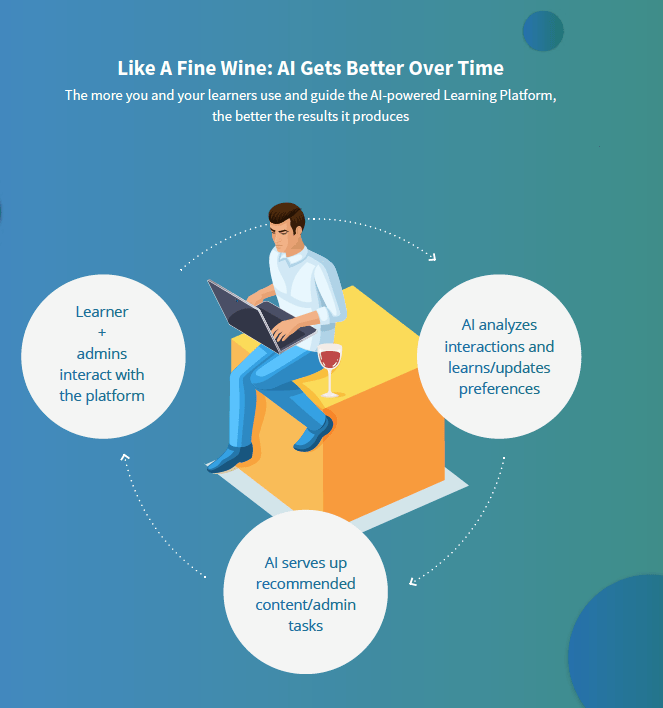
Artificial Intelligence (AI) is a buzzword on the lips of a wide range of business people. Unlike many trends, AI has crossed the boundaries of industries and is impacting us all.
Once thought of as a robot that would take over the world, we’re all now starting to realize just how useful it can be.
As we move into a new decade, the use of AI is on the rise and set to revolutionize the learning experience for learners and admins alike. Not only does it offer more personalized learning abilities, but, frankly, it will make your job a lot more enjoyable when all of your menial, time-consuming tasks are automated.
Business leaders are also tuned in, with 64% believing that AI will drive their organization’s growth, and 76% stating that AI is essential for their business’s strategy to succeed.
Still want to know more? Let’s take a look at why AI is making such a wave.
“HR orgs are strategizing for personalized, unstructured L&D – they see the correlation between employee-specific career journeys and increased engagement and retention. To get the strategy right takes an investment in next-gen adaptive analytics that break traditional expectations for stage-based learning to follow employee behavioral patterns. Behaviorally-driven programing is where the future of L&D is and this is indicative of a bigger future in adaptive and behavioral analytics.”
Zachary Chertok, Analyst at Aberdeen Group
The Driving Factor
In the past year, we’ve seen artificial intelligence gain more traction within learning as L&D pros develop a deeper understanding and providers refine their offerings.
Nearly 40% of enterprises have implemented artificial intelligence in some form in the past year – that’s up 270% in 4 years.
As the industry continues to innovate, AI will have a significant impact on L&D, particularly on how you will be able to scale your activities while leveraging personalization.
With the introduction of AI in the enterprise learning sphere, organizations are seeing massive changes in productivity as menial tasks are automated.
In fact, companies are starting to incorporate AI into their business strategies as they see the potential it has to increase growth.
Early Adopters
Selected learning technology providers, including Docebo, have seen the potential for AI in learning programs and have incorporated them into their core systems.
The exciting prospect is that AI engines, by their very nature, improve the more they are used. The more that a learner engages with the Learning Platform, the more AI can source and present course material personalized to a learner’s preferred topics, course format, and skill level.
Not only does this benefit your learners, but you experience the knock on effects of increased engagement, faster completion rates, and, ultimately, better performance.
In addition, many L&D admins have seen the difference that a bit of robo-support can make to their workloads – AI can scan vast amounts of content, pick out the most important parts of the asset for each individual learner, send course reminders, and answer questions. And this is just the tip of the iceberg.

What the Future Holds
It may be a cliche, but the sky really is the limit.
Over the next few years, the capabilities of AI will allow us to be more effective with our learning activities and ensure that each learner gets the personalized learning experience they need to succeed. Here’s what’s on the horizon:
Closing skills gaps – AI will give us the ability to more accurately identify employee skills gaps and suggest the best ways to close them.
Learning impact – As our most important metric, AI will help us to collect better and more accurate data on how learning materials are impacting individual and business performance.
Virtual coaches – Still in their infancy, virtual coaches will become smarter and more targeted as they support learners with a proactive response to personalized learning and development.
Advanced analytics – AI can collect and interpret a vast amount of data, meaning that you will be able to gather key insights easier than ever.
A Final Word
AI can help you to reach your performance goals quicker and in the best way for each of your learners.
As we begin to see learning strategies aligned with business strategies, the true value of AI unveils itself – AI helps to prove the ROI for learning and development teams, allowing you to scale your learning efforts and see business-focused results.
It’s important to remember, however, that the power of AI is only realized when there is increased interaction with the platform and the system begins to learn what works and what doesn’t for both learners and admins.
So, is Artificial Intelligence in digital learning here to stay? Absolutely, and it’s only going to get better.
To get a headstart on the trends set to impact the e-learning sector in the year ahead, get our report on the top e-learning trends for 2020!
